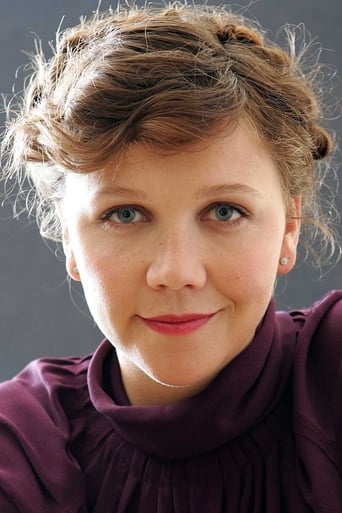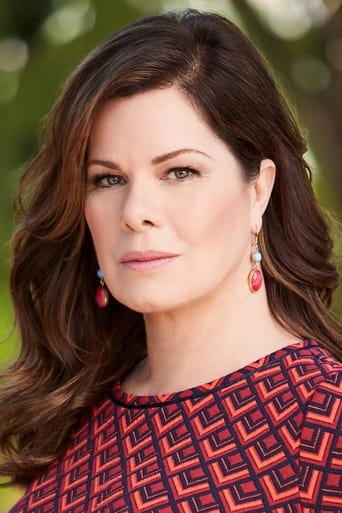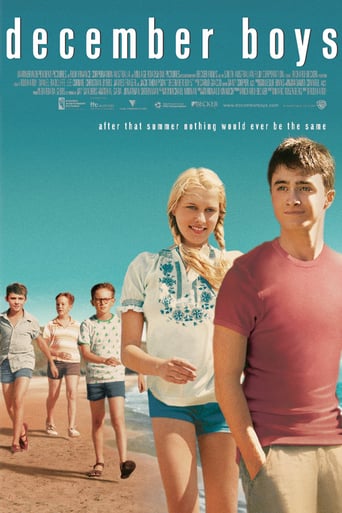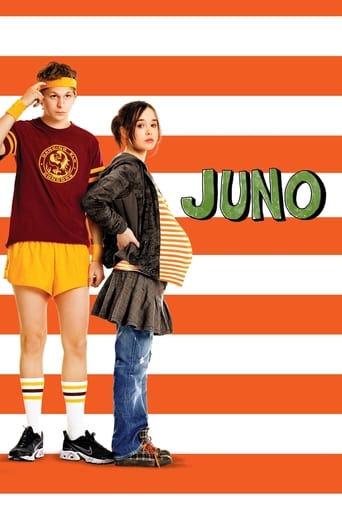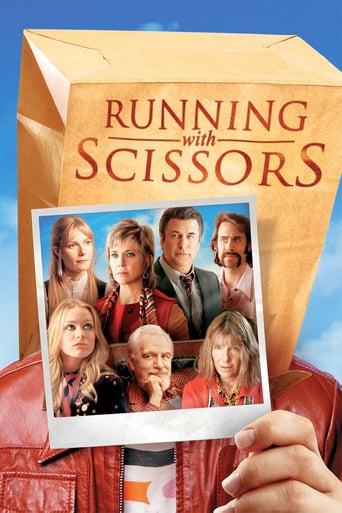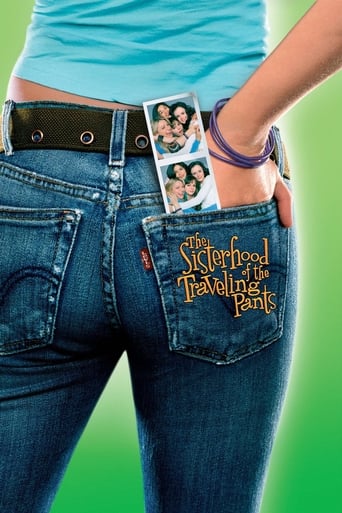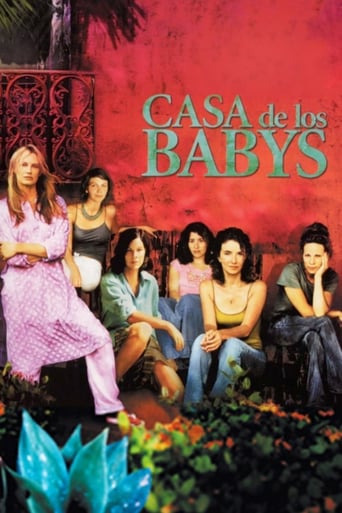

Casa de los Babys (2003)
A group of women, including Skipper, the wealthy young Jennifer and the domineering Nan, journey from the United States to South America in hopes of easily adopting children. Unfortunately, their plans are complicated by local laws that require the women to live in the foreign nation for an extended period before they can take in orphaned kids. While stuck in another country, the women bond as they share their aspirations and anxieties.
Watch Trailer
Cast


Similar titles
Reviews
This is perhaps the 3rd of 4th film I have seen by Sayles. As in the others, it was a slow one and demanded my patience.The choice of actors was great, and the use of local talent equally so. While I don't know about the accuracy of the adoption process in Mexico as depicted in the film, I find the story line and the backgrounds of the six adopting mothers creditable.This film can never be a big box office hit for the very narrow subject matter it deals with. There was no violence, no sex, no twisted plot in it. However, it is the kind that takes the viewers to different worlds - the worlds of the would-be mothers, of the poor in Mexico, of foreign adoption, and of government bureaucracy.We need more films of this nature - films that give you a new experience, films that explore human emotions, films that educate, and films that dig deep to explore. CDLB is definitely another worthwhile film by the master.
I must say I am a minor fan of Sayles, having enjoyed several of his movies (Lone Star in particular). And when it comes to creative endeavors, I'm all for people wearing multiple of hats - singer / songwriters have my deep respect, as do writer / directors. But the editing of this film should have been left to another person, as Sayles was most likely too close to see it objectively by the end of filming, and consequently the film suffers. Case in point: watching the DVD extra features, I was introduced to the background motivation for the various characters via the interviews with the actors. Too bad that background didn't actually MAKE IT INTO THE MOVIE! Is it on the cutting room floor somewhere? Who knows.This film is a mish-mash of characters, situations, and locales - NONE of which are developed in a satisfactory manner. As a result we are left to watch a variety of bland scenarios involving people we don't really know doing things we don't fully understand or really care about in a country somewhere in South America. The side plots, not being fleshed out, are more of a distraction than anything, which is a shame. The intersection of adoption, first vs. third world economics, capitalism, etc. would seem to be a fertile one, but the movie for some reason doesn't employ this to anywhere near full advantage. If being boring is the cardinal sin of movie making, this film will probably pass purgatory altogether and go straight to hell.As for the acting, It was a real treat seeing Rita Moreno after all these years. Marcia Gay Harden was terrific as the ugly American (I really hated her). Daryl Hannah was so-so as the new age health nut suffering in silence (though not quite enough silence for me - I started to wonder when she would whip out the chicken gizzard in the "psychic surgery" scene - can Hollywood please stop validating new age BS please?). Mary Steenburgen is always welcome, though she played a rather low-key role here. Lili Taylor seems doomed to play Lili Taylor for the rest of her life: outspoken, brash, self-assured to a fault, and a bit too quick on the snappy reply, though she did have some of the best lines. I had the feeling Susan Lynch was cast in order to relieve some of the white breaded nature of the US cast - she was generally fine, but her scene with the maid struck me as insensitive and self-indulgent (not what Sayles intended, I'm pretty sure). But the real sore thumb here was Maggie Gyllenhaal who played a weak, weepy, superstitious, infantile character that seriously grated on my nerves. The movie would be 10% better if her character were just somehow cut out.I just about fell off the sofa when the character played by Susan Lynch was relating her fertility surgery - paraphrasing: "they did a tubal ligation or something on me along with other things I can't even begin to understand". Earth to Susan's character: no wonder you are having fertility problems, you were freaking sterilized! Here's a tip: you might want to spend two minutes Googling your medical issues before someone starts carving you up like a thanksgiving turkey. Why the hell didn't one the actresses pick up on this and have Sayles fix it? I was struck dumb by this glaring technical idiocy, and it took me a while to come to my senses and get back into the movie (such as I was able to) after that.And when did it become OK again for movies to portray women as total flitty morons? Haven't we as a people progressed beyond this point over the last couple of decades or so? Some of the dialog was embarrassing close to "I don't know nothing about birthing no babies" - and these are supposedly women with fertility issues, who I would expect to have at least a passing knowledge on the subject. I'm aware that people like this do exist in real life, but can they not be rubbed in our noses as some kind of example of normalcy by Hollywood quite so much? Am I asking for too much here? My rating: 4/10
Adopting children should be a labor of love. After all, if a woman finds herself unable to conceive, it would probably be a good idea to let her go anywhere where orphans and children that have been given up for adoption to be reunited with an infant. Well, in most cases, as we see in this film, there are people that profit from this process. It has turned to be a commercial enterprise for many people. We know a few cases where overseas adoptions have cost upwards of $100,000.00, when all is taken into account.We meet six American women who have come to Mexico in the hope of adopting children. For one reason, or another, they haven't been able to have their own babies. The connection is clear, in this case, the lawyer in charge of the adoption recommend their clients to stay at Posada Santa Marta, where the owner, Senora Munoz is working with the unscrupulous man. Since the law requires to have a local lawyer, most would be mothers have to rely on this intermediary in order to adopt.The six women in the story are so different from one another that it is hard to imagine them socializing, had they not been thrown together in the hotel to await for their newly adopted babies. Although we don't get to know them in intimate details, we can see their desire to be mothers. The quiet Skipper turns out to be the one who has suffered three dreadful pregnancies in which all three infants had died. Nan, a pushy woman, is an unhappy camper. Everything irritates her and she lets anyone know about what she thinks about the country and the adoption procedures. Eileen, coming from a large Irish family has not been able to conceive. Leslie and Gayle seem to be the best adjusted of the women. Jennifer, is the youngest of them all.There are also a couple of stories running parallel to the American women. The most touching story comes from Asuncion, one of the maids in the hotel. When Eileen tries to communicate with her, the maid, not understanding her, tells her in Spanish about the way she had to give up her own baby girl for adoption. Also, we see what appears to be an upscale woman with her pregnant daughter, Celia, as the mother weighs her options and how the girl will not have an adoption. Celia, who is only fifteen years old, evidently had relations with Reynaldo, the young stud that roams the beach in search of easy conquests.John Sayles never cease to amaze us with his stories. In this film he tackles the commerce that goes on in the adoption process. At the same time, he makes a case for how complicated the whole thing is and how these would be mothers have to face as these young infants grow in an environment that stands in sharp contrast with the street children he brings into the movie. Those children are desperately in need for adoption, yet their own society, or would be parents, will bypass them in favor of the ones that can only be obtained in a legal manner.The ensemble cast does wonders under Mr. Sayles direction. Best of all is Marcia Gay Harden, as the pathetic Nan, a prototype of the "ugly American" abroad. Daryl Hannah has some excellent moments as Skipper. Lili Taylor, Mary Steenburgen, Maggie Gyllenhaal are fine. Susan Lynch has a great moment as she tries to talk with the maid. Vanessa Martinez gives a good rendition of her character Asuncion. Rita Moreno is also seen as the owner of the hotel."Casa de los Babys" takes an excellent view at the thorny issue of adoptions.
The genius of this film is exactly the characteristic that many here have criticized it for: it contradicts itself all over the place and ends abruptly with no resolution. What possible resolution could you expect? Adoption is an inherently troubling phenomenon. It always involves awkward intersections of race and class, opportunity and the lack thereof, sex and sexism, law and morals. I found this film to be deeply troubling in all the ways it should be, due to the topic. I think Sayles did a brilliant job bringing together a number of very believable characters and just showing them to us for 90-some odd minutes. All have their contradictions, and none clearly speaks some unambiguous authorial opinion. The son of the hotel owner mouths his leftist analysis with his buddies, but is really a drunken loser. Rita Moreno, through her frustration with her husband's politics, voices the frustration of so many women: politics is one thing, but who'll take care of the kids? And of course, the reverse is implied as well: kids are one thing, but who'll take care of the politics? You can go through each of the characters and seem some inherent pull in opposite directions.I loved that none of the characters is entirely sympathetic, except perhaps the three homeless boys. They are all complicated and corrupted by a complicated and corrupt world that places a premium on babies and motherhood, but only under the "right" circumstances for the right women and the right kids. I was very grateful that there was no real closure at the end, and that all Sayles had to say was that, despite all, both the least sympathetic and the most sympathetic of the potential moms were about to leave with babies. Anyone who cares about kids and women should see this movie. And certainly anyone who is considering adoption (domestic or international -- either way, it's all the same issues) should see it. In sum, a very thought-provoking movie.P.S. -- Did I mention the incredible soundtrack?


